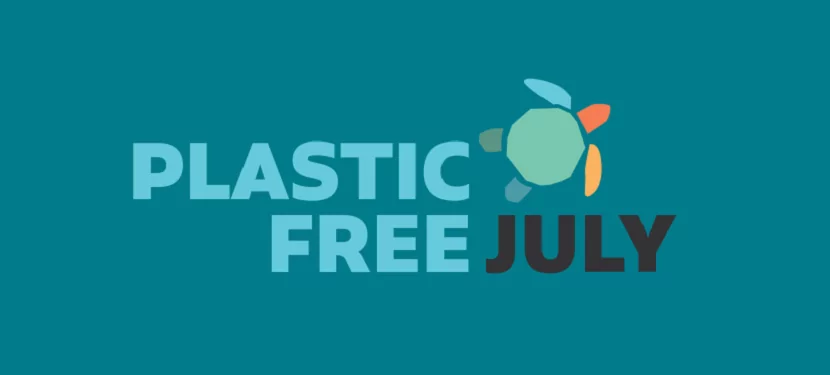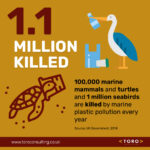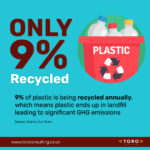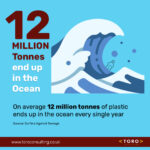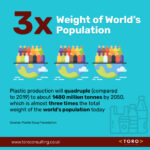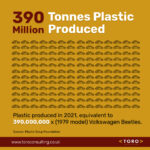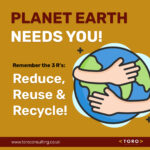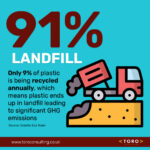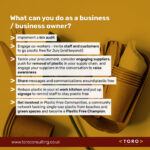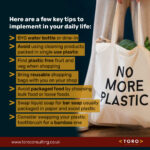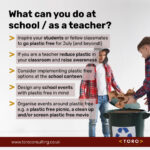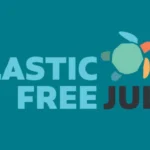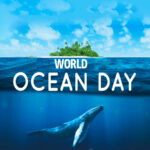This month is plastic free July!
The amount of plastic that is produced in the world every year has increased explosively in just a human lifetime from 2 million tonnes in 1950 to over 390 million tonnes in 2021. These are figures from the plastics industry itself, excluding synthetic fibres which means the real production is a lot higher.[1] The projection is that plastic production will quadruple (compared to 2019) to about 1480 million tonnes by 2050, which is almost three times the total weight of the world’s population today![2]
Plastic is a huge problem for our environment with only 9% of plastic is being recycled annually, which means plastic ends up in landfill leading to significant GHG emissions[3]. What’s more plastic finds its way into our oceans impacting marine life:
- On average 12 million tonnes of plastic ends up in the ocean every single year[4].
- 5 million tonnes of this enters the ocean from the land with 1.75 tonnes being chucked into the sea directly from the fishing and shipping industry[5].
- There are approximately 51 trillion microscopic pieces of plastic, weighing 269,000 tonnes[6].
- 100,000 marine mammals and turtles and 1 million seabirds are killed by marine plastic pollution every year.[7]
Concerned by these figures? Why not join plastic free July?
Plastic free July is a movement that helps millions be part of the solution to plastic pollution – to contribute to cleaner streets, cleaner oceans, helping maintain beautiful communities and thriving biodiversity.
Here are a few key tips to implement in your daily life:
- BYO (bring your own) water bottle or dine-in
- Avoid using cleaning products packed in single use plastic
- Find plastic free fruit and veg when shopping
- Bring reusable shopping bags with you on your shop
- Avoid packaged food by choosing bulk food or loose foods
- Swap liquid soap for bar soap usually packaged in paper and avoid plastic
- Consider swapping your plastic toothbrush for a bamboo one
Simply put, wherever possible, think about implementing the R’s: reduce, reuse and recycle!
You can also sign up for the Plastic Free July challenge here and get lots of plastic free ideas; take the Pesky Plastics Quiz here, be part of a survey on practices and consult the online resources.
Lucie and her family took the plastic free challenge and started saying no to the top four most prolific single-use plastics:
- plastic bags;
- water bottles;
- takeaway coffee cups;
- and plastic straws.
This way Lucie managed to reduce her recycling by half! After achieving noticeable results the word started to spread amongst her family and friends circle. If you want to learn more about Lucie’s story read more here.
What can you do as a business / business owner?
- Implement a bin audit
- Engage co-workers – invite staff and customers to go plastic free for July (and beyond!)
- Tackle your procurement, consider engaging suppliers, push for removal of plastic in your supply chain, and engage your suppliers in the conversation to raise awareness
- Share messages and communications around plastic free
- Reduce plastic in your at work kitchen and put up signage to remind staff to stay plastic free
- Get involved in Plastic Free Communities, a community network tackling single-use plastic from beaches and green spaces all the way back to the brands and businesses who create it here and become a Plastic Free Champion.
Businesses are starting to take action. Joining Plastic Free July to launch their ‘Breaking the Plastic Habit’ initiative in 2021, Brookfield Properties is now on track to remove over 1.75 million single-use plastics from its supply chain in Australia each year. IKEA is committing to phase out plastics from consumer packaging solutions by 2028. The phase-out will happen gradually with an all new range by 2025 and a running range by 2028. Whilst Lego has announced plans to stop the production of plastic blocks by 2030 and aims to make all packaging sustainable by 2025. The blocks will instead be made out of plant-based materials in an attempt to reduce plastic waste.
What can you do at school / as a teacher?
- Inspire your students or fellow classmates to go plastic free for July (and beyond!)
- If you are a teacher reduce plastic in your classroom and raise awareness
- Consider implementing plastic free options at the school canteen
- Design any school events with plastic free in mind
- Organise events around plastic free e.g. a plastic free picnic, a clean up and/or screen plastic free movie
In 2019 Strode College became the first plastic free communities approved college in the UK. Actions the college took included:
- Promoting Coffee refills to reduce the number of disposable cups given out
- Setting up water refill points around the campus and getting rid of plastic water bottles
- Ditching sachets in favour of refill condiment bottles
- Increased recycling to capture more waste
The college aimed to install a plastic-free vending machine and implement an on-site composting unit to deal with compostable food containers/packaging.
UCL is committed to becoming a single-use plastic free campus by 2024.This means UCL will not consume or purchase any non-essential single-use plastics on campus by 2024. This includes recyclable plastics, compostable plastics and hygiene plastics e.g. hand sanitiser. Essential single-use plastics which currently have no accessible, safe, or sustainable alternatives will still be used at UCL, but will be optimised and reduced. These include personal consumption items and essential plastics e.g. lab gloves which have no accessible, safe or sustainable alternative, or straws which are still required to make UCL accessible for everyone.
At societal level, the solution to plastic is transitioning to a circular economy – a regenerative system that aims to keep resources in use for as long as possible, extracting maximum value while minimising waste generation. When it comes to plastic waste, a circular economy focuses on creating a closed-loop system where plastic is recycled, reused, or repurposed instead of ending up in landfills or polluting our oceans. According to WRAP, it takes a whopping 75% less energy to make a plastic bottle from recycled materials compared to producing it from scratch. By reusing, reducing and recycling plastic, we can minimise our use of plastics and reduce our impact on the environment.
Join the voices globally pushing for the Global Treaty on Plastics, a new legally binding global instrument on plastic pollution to prevent and remediate plastic pollution and its toxic impacts and tackle the threat of plastics on the human, animal, and environment health from plastics.
[1] Plastic Soup Foundation: https://www.plasticsoupfoundation.org/en/plastic-facts-and-figures/
[2] Ibid
[3] Delphis Eco Team: https://delphiseco.com/blogs/news/its-plastic-free-july
[4] Surfers Against Sewage: https://www.sas.org.uk/plastic-pollution/plastic-pollution-facts-figures/
[5] Ibid
[6] Ibid
[7] UK Government, 2018








